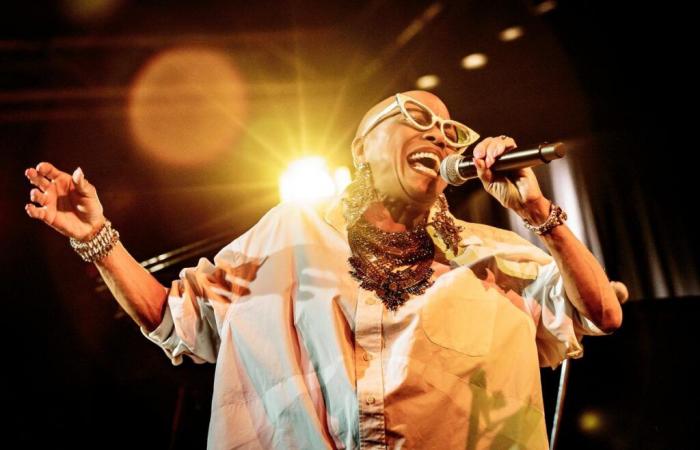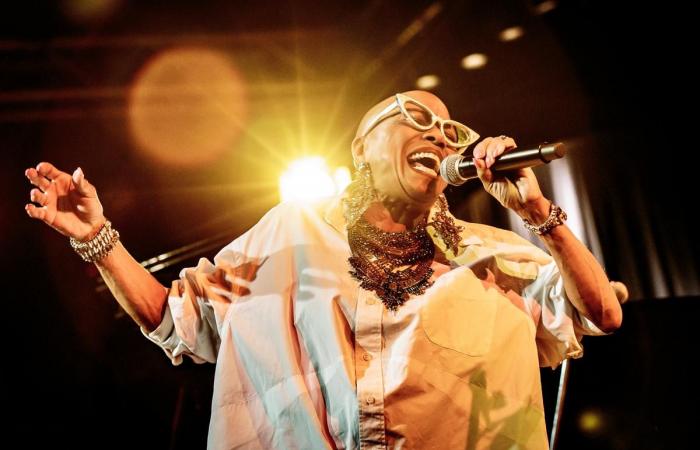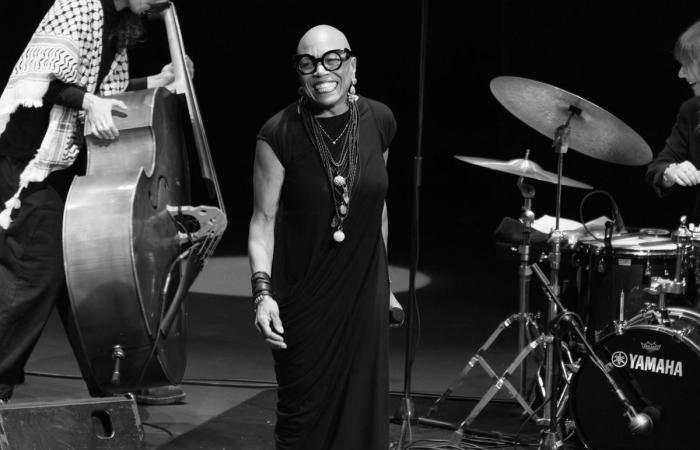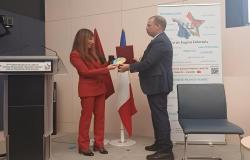On Wednesday, November 27, the famous American jazz artist’s Paris date was interrupted by a woman disturbed by the exhibition of a political symbol. The concert could not resume despite police intervention. Explanations.
Dee Dee Bridgewater in concert on March 16 in Milan. Photo Sergione Infuso/Corbis via Getty Images
By Anne Berthod
Published on November 29, 2024 at 6:17 p.m.
Mi-October, a Palestinian flag brandished on stage led the owner of the Café de la danse in Paris to officially exclude Israeli and Palestinian artists from its programming – an extreme and contentious measure which he reversed the following day. Wednesday evening, November 27, it was a keffiyeh hanging from the microphone of a musician who sowed discord during Dee Dee Bridgewater’s recital at the Espace Carpeaux in Courbevoie (Hauts-de-Seine), causing its interruption and the evacuation of five hundred spectators by the municipal police.
The European tour of the American jazz singer and pianist, who came to present a repertoire of protest songs with its female quartet (the aptly named We Exist!), had so far gone off without a hitch. Every evening, Rosa Brunello, the group’s Italian double bassist, hung a keffiyeh, this large traditional Arab scarf that has become the emblem of the Palestinian cause, on her microphone stand. The public never seemed to be moved by it.
The concert on November 27, in Courbevoie, was the last of Dee Dee Bridgewater’s seventeen French dates. But while the 74-year-old diva had been singing for a good forty minutes, a lady of the same generation sitting in the middle of the audience suddenly insulted her about the conspicuous presence of the square of black and white fabric, declaring that she was disturbed by the exhibition of such a political symbol. Dee Dee Bridgewater was about to sing the very militant Mississippi Goddam, by Nina Simone: an anthem of black anger, written in 1963, in response to segregation and a series of racist murders in Mississippi and Alabama.
This lady had the right to express her disapproval but she overstepped it when she took an entire room hostage.
China Moses, daughter of Dee Dee Bridgewater
The spectator’s apostrophe, when she had just explained the very political context of the song, took her by surprise, but the musician responded calmly, in French, reminding us that in a country like France, especially in a place of culture, everyone was free to express themselves and she was not in a position to restrict her musician’s right to speak. She resumed her song, supported by the audience who began to clap their hands to encourage her. Weary! Spectators had taken the troublemaker to task and she, amid boos, resumed her vituperations with even more force.
Anxious to restore calm, Dee Dee Bridgewater ended up asking her double bass player to remove the keffiyeh. The musician immediately untied it, but this gesture of goodwill was not enough to calm the spectator or defuse the spiral. Because in the process, the artistic director of Espace Carpeaux, Philippe Lignier, saw fit to take the microphone. No doubt he was primarily looking to find a compromise, but to say, in essence, that a concert was not destined to turn into a political forum, was clumsy to say the least.
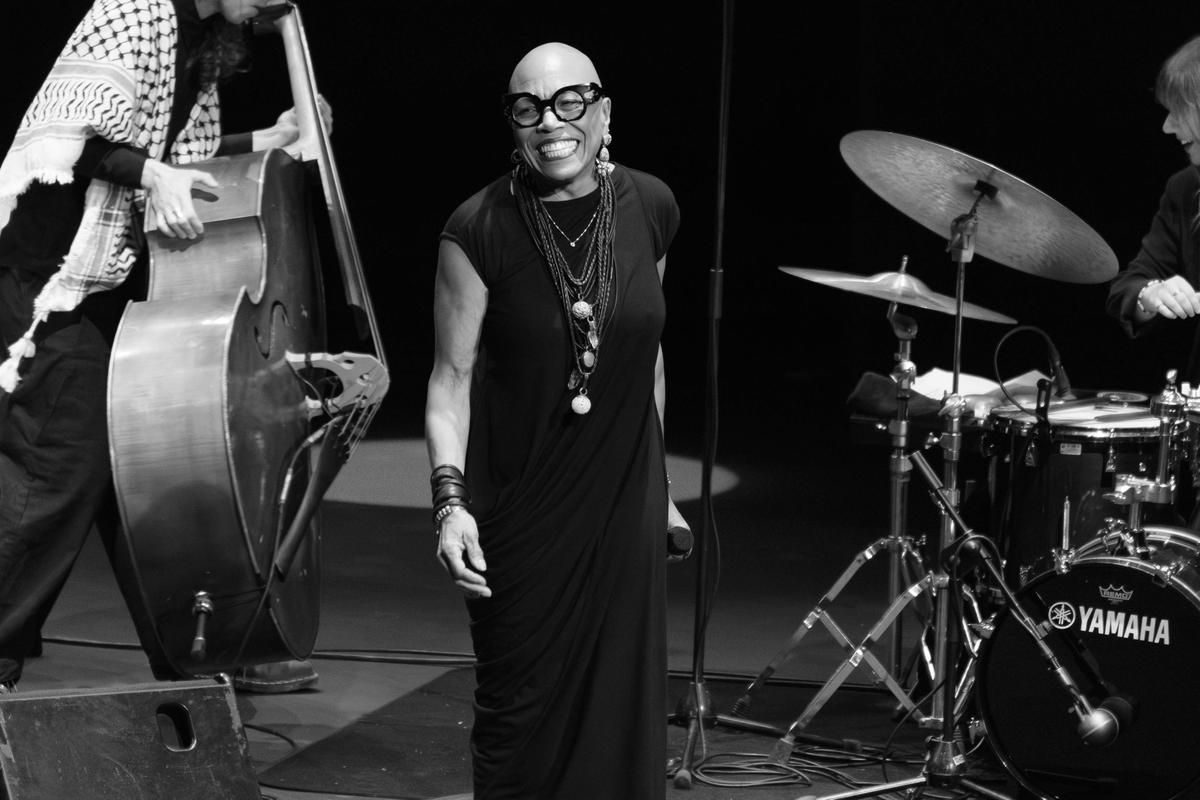

Dee Dee Bridgewater, on November 11 during her concert in Madrid. In the background, double bassist Rosa Brunello wears her keffiyeh. Photo Oscar Gonzalez/Sipa USA/SIPA
In the room, Dee Dee Bridgewater’s daughter, soul singer China Moses, jumped up. “I love Philippe very much and in the panic, his words undoubtedly went further than his thoughts, but I couldn’t let him say it without reacting. » In turn, the American, soul singer, actress and radio host on TSF Jazz, took the stage to express her disagreement. “A keffiyeh is a cultural sign, which has its place in a place of culture. But it must also remain a space of freedom, including political freedom. To conceal the political dimension of my mother’s music would be to deny her entire career. »
“This lady also had the right to express her disapprovalcontinues China Moses, but she overstepped it when she took an entire room hostage. » Because neither China Moses, nor Dee Dee Bridgewater’s film manager, nor even her own husband managed to reason with the spectator. Isolated, increasingly agitated, she resisted with many gesticulations when security agents wanted to make her leave the premises. Philippe Lignier finally called the police, who proved equally powerless to force this elderly lady. The rest of the public was evacuated. The septuagenarian, alone in the middle of the stands, remained seated for almost an hour before leaving.
Impossible, after that, to resume the concert. “The definitive interruption was decided by mutual agreement with Dee Dee Bridgewater, Gérard Drouot Production and the town hall”, specifies Sandrine Peney, deputy for Culture at Courbevoie and president of CourbevoiEvent, the local public company to which Espace Carpeaux depends. The spectators, most of whom are subscribers, will all be reimbursed. The troublemaker will be banned from the premises.
But on the question of the keffiyeh, the vagueness remains. At the Café de la danse, a clause in the rental contracts for its room now prohibits any “political demonstration” on stage, whether it is a flag or the symbol of a country. At Courbevoie town hall, Sandrine Peney does not plan, in principle, to censor an artist. Cautious, she would nevertheless like to avoid, in the future, “finding yourself faced with a fait accompli”, encouraging concert producers to ” prevent ” possible political demonstrations. An ambiguous answer, which raises endless questions.

